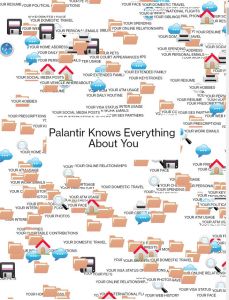
Lizette Chapman, Jordan Robertson and Peter Waldman
Palantir Knows Everything About You
Bloomberg Businessweek , 2018
What's inside?
A data-mining company is growing its bottom line at the expense of civil liberties.
Recommendation
Facebook may currently be the black sheep when it comes to privacy and data violations, but it isn’t the only company capable of watching every step you take. Bloomberg Businessweek writers Lizette Chapman, Jordan Robertson and Peter Waldman profile the big-data firm Palantir Technologies, which has evolved from helping the US government catch terrorists to assisting companies monitor their employees and helping law enforcement detect possible offenders. A common thread that runs through both companies is their desperate need to make money and please investors – which, as it turns out, is at odds with protecting people’s privacy.
Take-Aways
- Palantir Technologies makes software that can sift through large datasets and display data linkages and connections in spider web–like graphics.
- When JPMorgan Chase contracted with Palantir to help identify employees who were abusing company assets, the firm's project leader began monitoring staff members and executives.
- Civil liberties advocates are concerned about the Los Angeles Police Department’s use of Palantir software to identify and monitor potential criminals.
- Determined to grow its business, Palantir has neglected to put the oversight mechanisms in place to prevent potential violations of civil liberties.
Summary
Palantir Technologies makes software that can sift through large datasets and display data linkages and connections in spider web–like graphics.
PayPal co-founder and Silicon Valley investor Peter Thiel founded Palantir Technologies in 2004. The company makes software that sifts through large datasets and displays data linkages and connections in spider web–like graphics.
“As shown in the privacy breaches at Facebook and Cambridge Analytica – with Thiel and Palantir linked to both sides of the equation – the pressure to monetize data at tech companies is ceaseless.”
The first Palantir customers were the US Pentagon and the CIA, which used the software to enhance battlefield intelligence and to catch insurgents and terrorists in Afghanistan and Iraq.
When JPMorgan Chase contracted with Palantir to help identify employees who were abusing company assets, the firm's project leader began monitoring staff members and executives.
In 2009, JPMorgan Chase hired the company to analyze internal data and to highlight irregularities that might indicate illegal activities and abuses of corporate assets. However, Palantir’s stint at the bank resulted in a large spying scandal. The program’s leader, former US Secret Service agent Peter Cavicchia III, willfully and indiscriminately monitored the calls and emails of bank employees and senior executives.
“The company’s engineers and products don’t do any spying themselves; they’re more like a spy’s brain, collecting and analyzing information that’s fed in from the hands, eyes, nose and ears.”
Palantir, which was valued at $20 billion in 2015, has never made a profit and is struggling to find and keep private-sector customers, partially because of the high costs of its customized services. The pressure to make money is one reason for the company’s lax oversight mechanisms. Palantir, which employs 2,000 engineers, has only 10 people on staff who monitor potential privacy violations. Consequently, the company was unable to prevent Cavicchia from abusing his position at JPMorgan or to stop another Palantir employee from helping Cambridge Analytica extract data from 87 million Facebook users.
Civil liberties advocates are concerned about the Los Angeles Police Department’s use of Palantir software to identify and monitor potential criminals.
The use of Palantir’s services by US federal agencies and police departments has triggered additional legal and ethical concerns. For example, the Los Angeles Police Department (LAPD) uses the company’s Gotham product to identify potential criminals and make their names available to police officers, who are expected to use every opportunity they get to stop, ticket and interview them.
“For all of Palantir’s professed concern for individuals’ privacy, the single most important safeguard against abuse is the one it’s trying desperately to reduce through automation: human judgment.”
The LAPD also keeps track of potential criminals’ social network activities. This puts acquaintances of LAPD-monitored individuals at increased risk of becoming criminal suspects if they happen to be near a crime scene.
Civil liberties advocates are concerned about the Los Angeles Police Department’s use of Palantir software to identify and monitor potential criminals.
Meanwhile, US law remains ambiguous as to the legality of Palantir’s analytical tools. Federal government prosecutors and immigration agents have gotten into the habit of not identifying their software tools when they present evidence in court, thus preventing civil liberties groups from challenging Palantir’s services on constitutional grounds.
About the Authors
Peter Waldman, Lizette Chapman and Jordan Robertson are reporters for Bloomberg Businessweek.
This document is restricted to personal use only.
My Highlights
Did you like this summary?
Read the articleThis summary has been shared with you by getAbstract.
We find, rate and summarize relevant knowledge to help people make better decisions in business and in their private lives.
Already a customer? Log in here.






















Comment on this summary